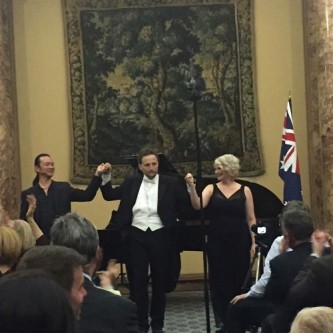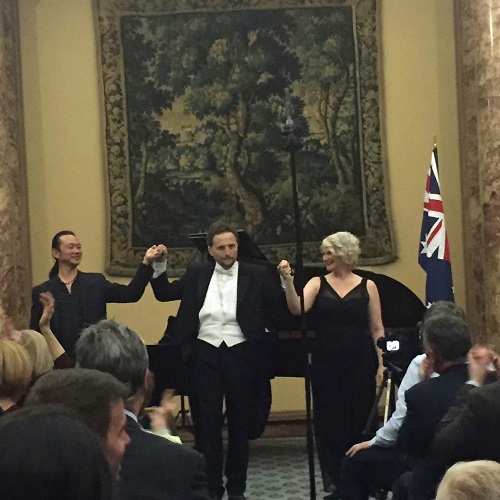 United Kingdom Various composers, Heroes & Heroines – Katrina Sheppeard (soprano), Warwick Fyfe (baritone), Kelvin Lim (piano): Australia House, London. 24.6.2016. (JPr)
United Kingdom Various composers, Heroes & Heroines – Katrina Sheppeard (soprano), Warwick Fyfe (baritone), Kelvin Lim (piano): Australia House, London. 24.6.2016. (JPr)

Excerpts from:
Wagner: Der fliegende Holländer, Lohengrin, Das Rheingold, Die Walküre.
Verdi: Nabucco, Aida
Strauss: Salome
Offenbach: The Tales of Hoffmann
Wolf: Prometheus
Arlen: Clancy of the Overflow
I have known about the Tait Memorial Trust since its early days late last century – doesn’t that sound old? In fact, it was about 24 years ago in 1992 when the Trust was formed by Isla Baring OAM in memory of her father Sir Frank Tait and his four brothers who played such an important part in the establishment of theatre and the performing arts in Australia. It offers monetary support for post-graduate study, performance opportunities to young Australian musicians and performing artists, and general help in the furtherance of their careers while resident in the UK. It was wonderful to be reminded in a copy of their newsletter about their first ever awardee, Liane Keegan. In 1997 I awarded her The Wagner Society’s Bayreuth Bursary and it brought back happy memories of my wife and I being in Bayreuth with Liane at an International Wagner Society dinner when the incomparable Sir John Tomlinson sat on our table with us.
Anyway, under the auspices of Hancock Artists Australia House welcomed Warwick Fyfe, a leading heroic baritone, and soprano Katrina Sheppeard to the plush Downer Room with its exquisitely carved panelling of Blackbean timber. Fyfe comes originally from Canberra and I have heard much about his success in 2013 as Alberich in Opera Australia’s Ring; he has an exceptional artist visa to allow him to work in the UK. Sheppeard has ongoing support from the Tait Memorial Trust and is a name new to me but I had heard how – after covering singers for a long time at ENO – she finally got to step in as Norma this season to great acclaim.
The chosen programme they sang was an eclectic collection of ‘bleeding chunks’ involving some of opera’s heroes and heroines – some more deserving of hero status than others … anyone voting for Salome? Neither Warwick Fyfe nor Katrina Sheppeard could be accused of not challenging themselves from the ‘Brünnhilde Battle Cry’ opener to its part-reprise as an encore.
Some singers are naturally more at home on the opera stage than when performing in a concert and I suggest Fyfe might be one of those. That his rich baritone sound has great expressivity was revealed by his ‘Scintille diament’ from The Tales of Hoffmann. Engagingly, he had told us he was not allowed to sing this aria when he made his UK operatic debut as the villains for English Touring Opera’s recent production …but he was ‘jolly well going to sing it now’. He was best when what he was singing was more character driven such as ‘Bin ich nun frei?’ from his signature role as Alberich and his curse was as good as you are likely to hear. As Amonasro – someone else seeking revenge – he joined Sheppeard in the duet from Aida Act III and, as good as their Wagner was, I don’t know if the wood panelled walls of the Downer Room resonated more to Verdi because both singers were at their very best here. This duet was one of the evening’s highlights as was Sheppeard’s ‘Anch’io dischiuso un giorno’ from Nabucco which was suitably plaintive and revealed all of Abigaille’s touching vulnerability.
Singing excerpts as Ortrud and Senta as well as her opening ‘Battle Cry’ as Brünnhilde, Sheppeard’s voice revealed a mezzo-ish quality and reminded me more than a little of Nina Stemme but her dramatic soprano was revealed as its impressive best by the time she sang her ‘Hojotohos’ again at the end. Her wonderful Schlussgesang as Strauss’s Salome had by then thoroughly warmed up her voice. This was a heartfelt confession of deranged love and at this point the venue didn’t matter and she engaged us with her engrossing performance.
Piano accompaniment is at its best when it just does its job. This seems like damning with faint praise but we are there to hear the singers and not to have the pianist take attention from them. Kelvin Lim is one of the best and most knowledgeable accompanists around for this sort of repertoire and he sensitively and unobtrusively shadowed the vocal lines whilst adding drama to what we were hearing, as composers such as Wagner, Verdi and Strauss intended.
A case in point was what Lim added to Hugo Wolf’s barnstorming – or should that be heaven-storming? – Prometheus which Fyfe sang, having been warned off it in his early days by one of his first singing teachers. This was another highlight of Warwick Fyfe’s performance but it was left for him to show he was even better when singing in English and now able to totally connect with his audience. Fyfe brought to vivid life Albert Arlen’s evocative setting of Banjo Patterson’s poem Clancy of the Overflow. First published in 1889 in an Australian news magazine it is sung from the viewpoint of a city-dweller who once met Clancy, a shearer and drover, and now longs for the imagined pleasures of his lifestyle, which he compares favourably to life in ‘the dusty, dirty city’ and ‘the round eternal of the cashbook and the journal’. All very idealised and romantic of course but perfect for this concert at Australia House and at the end of Warwick Fyfe’s compelling account I doubt there was anyone who didn’t envy the freedom of Clancy’s life in the bush.
Jim Pritchard
For more about The Tait Memorial Trust visit http://www.taitmemorialtrust.org/ and for about Hancock Artists visit https://hancockartists.com/.
